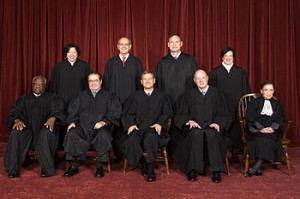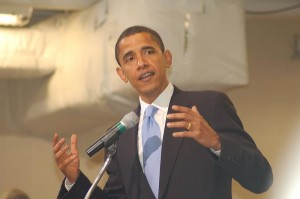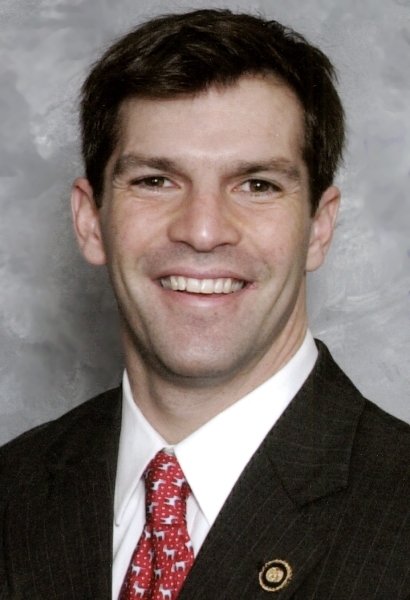By Lauren Mayer, on Wed Nov 26, 2014 at 8:30 AM ET One of the best scenes in Blazing Saddles is when the railroad workers negotiate with Rock Ridge to help build the ‘false front’ town that will fool Hedley Lamarr’s evil army. The racially mixed workers want to be repaid with land in town, and at first the townspeople object to including various ethnic groups. Eventually they agree to accept the Chinese and African Americans but “we don’t want the Irish.” However, when Sheriff Bart insists, the group’s leader finally says, “Oh, prairie sh*t, everyone!” and a happy ending ensues.
Apparently, not much has changed in 40 years (I know, those of us who remember when that movie first came out are OLD), as far as some people’s reactions to President Obama’s recent executive actions on immigration reform. Right-wing stalwarts like Michele Bachmann and Steve King project a ruined country overtaken by illiterate criminals, and even saner politicians are accusing Obama of acting like a tyrant, emperor, king, or dictator, when multiple Republican presidents (including ‘Saint Reagan’) did basically the same thing without any protest.
Meanwhile, there are very few of us in the country today whose anceestors weren’t immigrants at one time, so to help everyone chill out a bit, here’s a relaxing musical tribute to immigration . . .
By Patrick Derocher, on Fri Feb 22, 2013 at 3:00 PM ET Wilbur has taken flight. Not only to both the U.S. Chamber of Commerce and AFL-CIO support some manner of comprehensive immigration reform, but they have found at least a modicum of common ground on the matter, releasing a statement of principles yesterday afternoon.
This is a good thing—if organizations as ideologically divergent as the Chamber and AFL-CIO can agree on significant reforms of the American immigration system, maybe Congress can do the same. Their statement rests on three basic principles: American workers should have the first opportunity to fill American jobs, businesses that cannot fill all positions with American workers should be able to hire foreign-born workers through a streamlined process, and we need an accurate and transparent system to identify and address labor shortages to enable hiring foreign workers when it is needed. To fulfill these requirements, the Chamber and AFL-CIO suggest creating federal agency that would track the status and needs of the American labor market.
Apart from the incongruity of the U.S. Chamber of Commerce calling for another organ of the federal government, there are some flaws with this plan. To be sure, the underlying goals of these principles, to protect both American- and foreign-born workers and optimize the labor market for them and their employers, are laudable. As, of course, is these organizations’ willingness to cross ideological boundaries and work together. From an economic and regulatory perspective, however, there are some problems.
In their statement, the Chamber and AFL-CIO call for a guest worker program, designed to respond to the needs of the labor market. In theory, this is a great idea—when they can, American business will hire American-born workers, and when they cannot, they will be able to hire foreign-born workers with a minimum of bureaucratic involvement. Therein lies the catch: the fact is, it is nearly impossible for a federal, top-down program to ascertain, let alone keep up with, the visa needs of a complicated labor market.
This sort of program has been tried before, most notably with the Bracero Program. A sort of predecessor to contemporary H-2A visas, the Bracero Program was a joint effort with the Mexican government between the 1940’s and 1960’s that brought agricultural and railroad workers into the United States to work for a set period of time before heading back to their homes (although a number stayed and received green cards). Even then, when the population of the United States was around half of its current level, federal regulations couldn’t keep up with demand levels in the labor market, and illegal immigration continued. Illegal immigration, as it turns out, almost perfectly meets labor market demands, and is really a complement to legal immigration under the current system. (This idea has been gaining currency and is not a new one.)
So, what of it? Just because a guest worker program as has been proposed is too cumbersome for a long-term solution does not mean we should abandon the notion altogether—allowing illegal immigration to continue as it does only contributes to degraded working conditions of both American- and foreign-born workers. This country can find a solution, and I will start exploring some of the specifics and (humbly) proposing some of my own ideas in the coming weeks.
By Patrick Derocher, on Fri Feb 1, 2013 at 3:00 PM ET Immigration seems to be doing some odd things to the conservative movement. Following this week’s reveal of a bipartisan reform outline in the Senate, public and press attention shifted quickly to Marco Rubio, the Florida Republican who is more than a little bit of a rock star in conservative circles. This plan represents the culmination of a major shift in Sen. Rubio’s position– when running for Senate just two years ago, he had dismissed the idea of granting much of anything in the way of citizenship or related rights to illegal immigrants. (Incidentally, while in the Florida House of Representatives, Rubio proposed a DREAM Act-esque plan that would have cut tuition for undocumented students.) Conservative media figures, among them Sean Hannity and Rush Limbaugh, responded positively, especially considered that the Senate plan involves a path to citizenship, which many on the right believe to be tantamount to amnesty (and we all know how Rush feels about that). So we can be forgiven for thinking that the conservative base may be falling in line with some form of comprehensive immigration.
Not so fast. After an interview with Rubio this past Tuesday (which was, by all accounts, a smashing success for the Senator), Rush felt compelled to post this clarification on his Web site (warning: full transcript ahead). Key quote: “nobody else has the guts to criticize Obama, and that’s what I was praising him for. I was not signaling that he converted me to amnesty.” And there’s the problem. For many on the right, including a large number of primary voters, anything approaching amnesty is heretical, as evidenced by major backlash in 2006-7 and continued unease with comprehensive reform. This, of course, runs right into the strong, almost fervent support Rubio has built up in conservative circles in recent years. It’s a tricky balancing act for the conservatives and the Republican Party, and no matter how it plays out, things will get interesting.
By Patrick Derocher, on Fri Jan 25, 2013 at 3:02 PM ET There’s a new CNN poll out that was taken about week before his inauguration. For that poll, researchers at research firm ORC International asked respondents their opinions on a number of President Obama’s 2nd term objectives, including climate change, healthcare, and immigration. Some of the poll’s results are entirely unsurprising: voters are split on whether climate change is anthropogenic, with Republicans more skeptical than Democrats, that sort of thing. But the immigration responses are worth examining. By a 10-point margin (53%-43%), Americans favor policies that focus on providing a path to citizenship for illegal immigrants, rather than deporting them, a major change from a year ago when voters favored deportation 55-42.
This is big.
As Jeb Bush and Clint Bolick (both, I should note, prominent conservatives) point out in a Wall Street Journal editorial this morning, the notion that illegal immigrants should “wait in line” is not only untenable, but wildly inaccurate. There is, quite simply, no mechanism for such undocumented workers to have come into this country in the first place. At the risk of sounding too much like a cliche, this is a huge problem for Republicans. To the party’s credit, there are some leaders working to fix that problem, most notably Cuban-American Senator Maro Rubio. His proposal, however, focuses on high-skill visas, to some extent at the detriment of lower-skilled workers (it seems more than a tad unrealistic to expect someone who has been laboring in such a position to be able to pay fees, let alone take time off from work to do community service).
This sort of mindset, one that focuses on punishment (albeit, with a more positive outcome than, say, Jim Sensenbrenner’s proposals) is the real problem for the Republican Part. That is not to say that a wholesale embrace of the Democratic strategy is the best route for the GOP (as Ruben Navarrette points out, the DREAM Act and its proponents have their own issues). Rather, balance and a Buckley-esque acquiescence to reality is the key here, and that is what this WWG set out to formulate and communicate.
By Jeff Smith, on Tue Nov 13, 2012 at 9:15 AM ET  Dear Republican Party: Dear Republican Party:
1) Return to your fiscal conservative roots. Adhere to your rhetoric about not crippling the next generation with debt by supporting policies that would actually balance budgets, as opposed to Ryan-esque chimera and other supply-side delusions.
You may recall how the economy fared in the 1990s after every Republican legislator voted against Clinton’s ’93 tax hike and asserted it would kill the economy. Did a Republican Congress that limited spending help satisfy bond traders, keeping interest rates low and powering growth? Sure. But the public associates that growth with Clinton. Your doomsday rhetoric about Clintonomics cost you credibility, and a decade of feeble growth following the Bush tax cuts didn’t restore it.
2) As true budget hawks, take the lead in two areas where the nation could save billions: military spending and prison reform. Want to win the votes of young people and minorities? Bingo. Young people have overwhelmingly opposed recent overseas conflicts, and in a time of fiscal austerity when college grads are moving back in with their parents, the fact that that we spend more than the next 10 highest spending nations combined should be sobering.
Prison reform could be two-fold. First, train offenders in prison in entrepreneurship. Pilot programs in this area have reduced recidivism by as much as 80% – and 60% recidivism rates drive corrections spending. Second, focus on sentencing reform so that we don’t continue locking up non-violent offenders for decades as part of misguided “three-strikes” and “truth-in-sentencing” laws. Since minorities are disproportionately affected by the prison-industrial complex, they would appreciate a focus on sentencing reform.
 3) Stop opposing the DREAM Act. The writing is on the wall. These approximately 15 million folks aren’t going anywhere; they’re not self-deporting and government lacks the will and the money to deport them, other than criminals who are apprehended. These 15 million mostly consider themselves Americans. Almost all work hard and play by the rules. Quit appeasing your eroding base of old white people and get with the program. 3) Stop opposing the DREAM Act. The writing is on the wall. These approximately 15 million folks aren’t going anywhere; they’re not self-deporting and government lacks the will and the money to deport them, other than criminals who are apprehended. These 15 million mostly consider themselves Americans. Almost all work hard and play by the rules. Quit appeasing your eroding base of old white people and get with the program.
4) Stop talking about gay people. As has been obvious from the generational divide in polling on the issue for the past decade that ship is sailing away from you, fast.
Read the rest of…
Jeff Smith: 7 Things Republicans Must Do
By Patrick Derocher, on Thu Jul 12, 2012 at 3:00 PM ET It’s the second most-discussed Supreme Court decision of last month – on June 25, the Court handed down a ruling on Arizona’s extraordinarily controversial SB 1070, one that was hailed as a win by court-watchers on both sides of the aisle. Supporters of the law celebrated that the Court upheld a section of the law allowing police officers to check people’s legal status during their course of duties – what Arizona Governor Jan Brewer referred to as “the heart of the law” – while opponents lauded the assertion of federal authority over immigration policy.
In any case, a few things are clear: the Court struck down the provisions in SB 1070 that overstepped state-federal boundaries (namely criminalizing working in the US illegally), upheld the letter of the law that allows law enforcement officials to check immigration status, and left the door open to challenges of that law once it has gone into effect.
In what is probably the most-quoted line in the ruling, Associate Justice Anthony Kennedy writes for the majority:
“At this stage, without the benefit of a definitive interpretation from the state courts, it would be inappropriate to assume §2(B) will be construed in a way that creates a conflict with federal law […] This opinion does not foreclose other preemption and constitutional challenges to the law as interpreted and applied after it goes into effect.” [SupremeCourt.gov]
That Kennedy has sided with the majority in a case that sharply delimits state power is interesting enough (though perhaps not as interesting as the fact that Chief Justice John Roberts also sided with the majority). What is perhaps more important, though, is Kennedy’s implicit dare to the federal government and, to a lesser extent, the Arizona.
His dare to the state is obvious enough: Prove to us that you aren’t racially profiling, which this law makes it dangerously easy to do. This provision, of course, is what President Obama, Attorney General Holder, and countless activists were protesting when they challenged SB 1070, and yet the Court has not really spoken Section 2, waiting for a case regarding the law’s implementation to be brought forth. Less obvious is his dare to the Obama Administration (and indeed all subsequent administrations) to enforce the federal government’s immigration laws.
By reaffirming the supremacy of the federal government in such matters, Kennedy has made it incumbent upon the federal government to enforce immigration laws. The driving force behind SB 1070 was, of course, to compensate for lack of action on the feds’ part, and the frustration underlying that law isn’t going to disappear. Rather, it seems that Kennedy has put out a surreptitiously conservative ruling of his own – while states won’t be able to take immigration enforcement into their own hands as much as some might like, the opinion may well provide ammunition for Republicans looking to elect federal officials who will enforce immigration laws more strenuously than in the past.
By Artur Davis, on Fri Jul 6, 2012 at 8:30 AM ET  If you’re scoring the Supreme Court’s Solomonic ruling on immigration, consider this counter-intuitive result: liberals who would be expected to cheer a ruling that wipes out much of Arizona’s controversial law have sounded strangely conflicted, and from the New York Times to the New Republic, have described the surviving component that allows local law enforcement to determine the legal status of individuals lawfully in their custody as everything from the “centerpiece” of the statute to “its most controversial” element. If you’re scoring the Supreme Court’s Solomonic ruling on immigration, consider this counter-intuitive result: liberals who would be expected to cheer a ruling that wipes out much of Arizona’s controversial law have sounded strangely conflicted, and from the New York Times to the New Republic, have described the surviving component that allows local law enforcement to determine the legal status of individuals lawfully in their custody as everything from the “centerpiece” of the statute to “its most controversial” element.
It’s an odd approach to a legal victory. Heretofore, the most vocal concerns around SB 1070 (and copycats like the Alabama version) have focused on the blunt-force impact restrictionist statutes have on prototypical undocumented residents and their families: these laws make no bones about a pretty harsh sounding goal, expelling illegal immigrants from communities by rendering them virtually uninhabitable if you lack valid legal status. For example, Section 3 of the Arizona law, which made it a misdemeanor to lack valid immigration documents, and Section5(c), which made it a misdemeanor for an illegal immigrant to even seek work, had the straightforward purpose of pressuring illegal immigrants to move. To more liberal critics of these measures, the so-called “self deportation” strategy exudes a racial ugliness at worst, and a mean-spiritedness at the least.
 But it does not require either compassion or permissive liberalism to recoil at the idea of states solving their illegal immigrant dilemma by kicking the problem next door. Arizona’s toughness, over time, would have almost certainly scattered more of its undocumented population to Colorado, California, or Nevada than Mexico. That entirely legitimate policy instinct may well have influenced the conservative swing justices, John Roberts and Anthony Kennedy, as much as the narrow legal doctrine of preemption that technically decided this case. But it does not require either compassion or permissive liberalism to recoil at the idea of states solving their illegal immigrant dilemma by kicking the problem next door. Arizona’s toughness, over time, would have almost certainly scattered more of its undocumented population to Colorado, California, or Nevada than Mexico. That entirely legitimate policy instinct may well have influenced the conservative swing justices, John Roberts and Anthony Kennedy, as much as the narrow legal doctrine of preemption that technically decided this case.
Read the rest of…
Artur Davis: The Court’s Mixed Decision on Immigration
By Artur Davis, on Wed Jul 4, 2012 at 8:30 AM ET  There was genuine suspense in Barack Obama’s announcement that he will through executive order legalize about a million young undocumented immigrants. The details are a bit more nuanced—a minimum five years residency, high school graduate status, and a crime free record are preconditions, and the order contemplates applications for guest worker status rather than citizenship—but it is still a sweeping unilateral move that broke the partisan gridlock on immigration. As such, the non-Fox media has pronounced it a masterstroke that will widen the already sizable gap between Obama and Mitt Romney with Hispanics. There was genuine suspense in Barack Obama’s announcement that he will through executive order legalize about a million young undocumented immigrants. The details are a bit more nuanced—a minimum five years residency, high school graduate status, and a crime free record are preconditions, and the order contemplates applications for guest worker status rather than citizenship—but it is still a sweeping unilateral move that broke the partisan gridlock on immigration. As such, the non-Fox media has pronounced it a masterstroke that will widen the already sizable gap between Obama and Mitt Romney with Hispanics.
 To be sure, the politics are considerably more complicated. The white working class voters whom Obama is struggling with, and who swung decisively toward Republicans in 2010, are unlikely to be impressed. The portion of the Latino vote preoccupied with immigration policy, as opposed to jobs or social issue controversies, could already be secured for Obama and this latest move may not move the needle much more. To conservatives, Obama’s by-pass of Congress drives the narrative that a closet, hard-left agenda is lurking in a second term, which may keep them galvanized to defeat him. To be sure, the politics are considerably more complicated. The white working class voters whom Obama is struggling with, and who swung decisively toward Republicans in 2010, are unlikely to be impressed. The portion of the Latino vote preoccupied with immigration policy, as opposed to jobs or social issue controversies, could already be secured for Obama and this latest move may not move the needle much more. To conservatives, Obama’s by-pass of Congress drives the narrative that a closet, hard-left agenda is lurking in a second term, which may keep them galvanized to defeat him.
Read the rest of…
Artur Davis: Immigration and a Missed Opportunity
By Zack Adams, RP Staff, on Mon Oct 24, 2011 at 12:00 PM ET  Jeff Smith Perry’s attack itself may not have been that effective, but the reply he elicited from Romney was sure damaging: “I’m running for office, for Pete’s sake,” Mitt said he told his contractor. “I can’t have illegals!”
Debates are about moments that (appear to) crystallize candidates as human beings. After the hostage crisis and other blows to American prestige, people craved strength in 1980, and so when Reagan boomed, “I paid for this microphone!”, it suggested that he could be provide America the backbone it wanted at that moment. When George H.W. Bush looked at his watch in the 1992 town hall, it indicated that he just wasn’t that concerned with people’s plight – as opposed to the famed Clinton empathy to which a recession-weary nation responded. A simple gesture spoke volumes, because it comported with what Americans suspected was true: Bush was out of touch with their suffering.
In that vein, “I’m running for office, for Pete’s sake – I can’t have illegals!” Romney offered a window into his character: ambitious, practical, hands-on, and utterly lacking in principle. Let’s see if Perry can capitalize on this gift in the coming days.
(Cross-posted, with permission of the author, from Politico’s Arena)
By RP Staff, on Fri Oct 7, 2011 at 10:00 AM ET The Politics of Immigration Remember back in the day when Arizona Governor Jan Brewer erroneously claimed that the Arizona desert was strewn with “beheaded” bodies from Mexico? Or, more recently, when Texas Governor (and GOP presidential candidate) Rick Perry showed off his geography skills by claiming that Juarez was the most dangerous city in America? Nobody disputes that there is extreme, gratuitous and savage violence occurring in Mexico, but in a New York Times op-ed piece yesterday, El Paso resident Veronica Escobar bemoans the misrepresentation of the border region for political advantage. [All Quiet on the Southern Front]
How do you say “LGBT” in Español? A recent rally in Chicago brought two seemingly disparate groups together to fight for basic civil rights and against marginalization. [Hispanically Speaking News]
Y por fin, ESPN’s annual “Body Issue” will hit the newsstands this Friday, and it features its fair share of Latino athletes in the buff. Fortunately for las damas, most of the Latino sports celebrities are hombres (including José Reyes, Hélio Castroneves and Sergio Martínez). But don’t worry, chicos, the one image of Spanish golfer Belen Mozo is worth the look-see. [Meet The Hispanics]
|
The Recovering Politician Bookstore
|















